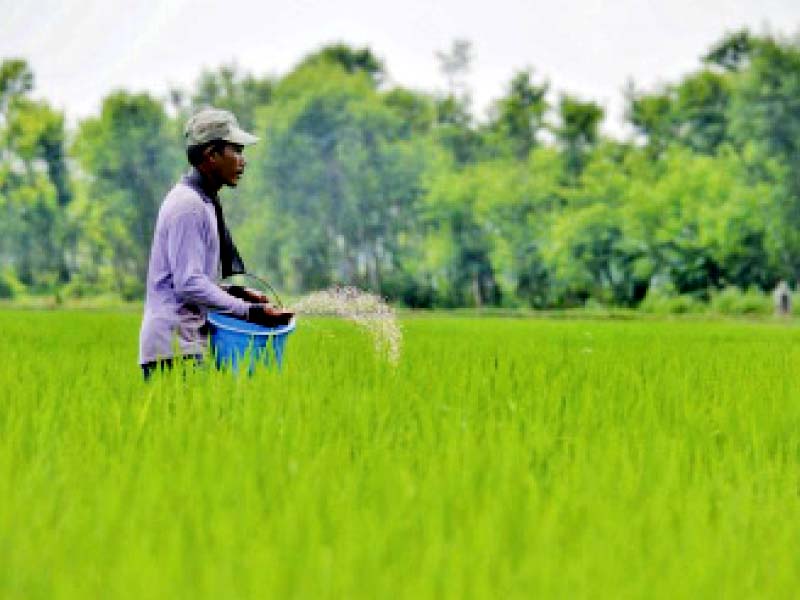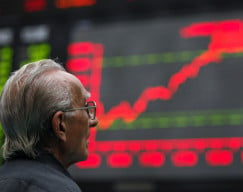
Adviser to Prime Minister on Finance Dr Abdul Hafeez Shaikh seems in a tight spot, as the fertiliser manufacturers’ budget proposal carries weight due to a mismatch between input and output sales tax rates.
The high ratio of input taxes and low rates charged on final product has created Rs32 billion refunds, which has affected the manufacturers’ liquidity, which may end up in increasing cost of fertiliser - an important farming input.
Led by Fauji Fertiliser, the industry players have put forth a budget proposal to end the discrepancy between sales tax charged from the consumer of the fertiliser and the inputs that the industry uses to produce the fertiliser, said sources in the Ministry of Finance. The manufacturers have also demanded abolishment of further 3% sales tax on import of diammonium phosphate (DAP) and other fertiliser from July aimed at improving phosphate fertiliser availability in the country.
The fertiliser manufacturers held a meeting with the finance adviser and representative of the Federal Board of Revenue (FBR) to sort out the issues. They demanded that the general sales tax (GST) on gas, chemicals and other raw materials be reduced to zero to stop the accumulation of sales tax refunds, sources informed The Express Tribune.
The government currently charges 5% sales tax on natural gas and regasified liquefied natural gas (RLNG) used as feedstock, 5% on phosphoric acid, 10% on rock phosphate and 17% on other inputs. However, the GST rate on a fertiliser bag is 2%, which has resulted in a build-up of around Rs32 billion sales tax refunds.
The government had cut the GST rate on fertiliser to directly pass on the impact of government subsidies to the farmers, which were earlier paid indirectly and were prone to misuse.
But the sources said that the government did not show a willingness to reduce the tax rates due to the IMF pressure. As a matter of policy, the IMF has asked Pakistan to withdraw all sales tax concessions.
If the government implements the IMF condition, the GST rate on fertiliser will go up from 2% to 17%. The global lender also seeks an increase in GST rates on inputs like gas and chemicals to 17%.
Increasing the GST rates to standard 17% will yield additional Rs100 billion revenues but would also push the prices of fertiliser bag by around Rs110, told the sources.
The government is reluctant to take measures that may compromise Pakistan’s food security particularly at a time when agriculture is the only sector that is not affected much by the novel coronavirus pandemic.
Sources said that the government has indicated introducing separate sales tax refunds mechanism for the fertiliser manufactures on the pattern of the textile industry. However, the textile industry still complains about slow progress in repayment of their refunds despite introduction of a new refund payment system in July last year.
The fertiliser manufacturers are of the view that the sector was currently paying Rs101 to Rs144 per bag sales tax on inputs but only Rs31 per bag tax is adjusted at the output stage due to low tax rate of 2%.
This is resulting in Rs70 to Rs113 per bag accumulation of sales tax refunds. Due to this situation, the manufacturers have demanded that their inputs like natural gas, RLNG, phosphoric acid, rock phosphate should be charged under the zero-rating sales tax facility.
For the next fiscal year 2020-21, the IMF has proposed Rs5.1 trillion tax collection target as part of the macroeconomic framework. The IMF has asked Pakistan to introduce fiscal stabilisation budget if it is keen to revive the stalled $6 billion programme.
The IMF has not approved the second review of the $6 billion Extended Fund Facility (EFF) that remains pending since March. The revised date for the approval of the second review was April 10, which the IMF again postponed.
To achieve Rs5.1 trillion tax collection target, FBR needs to attain a 31% growth rate in collection in the next fiscal year, which seems quite challenging.
The manufacturers have also demanded that the input tax adjustment should be allowed in cases where the dealers are not registered under the sales tax law. Currently, such input adjustment is not available where sales to unregistered persons exceed Rs10 million in a month.
Published in The Express Tribune, May 10th, 2020.
Like Business on Facebook, follow @TribuneBiz on Twitter to stay informed and join in the conversation.

1722586547-0/Untitled-design-(73)1722586547-0-165x106.webp)


1732326457-0/prime-(1)1732326457-0-165x106.webp)





1719053250-0/BeFunky-collage-(5)1719053250-0-270x192.webp)






COMMENTS
Comments are moderated and generally will be posted if they are on-topic and not abusive.
For more information, please see our Comments FAQ